小学英语动词、词组、句型汇总归纳
小学英语动词、词组汇总归纳
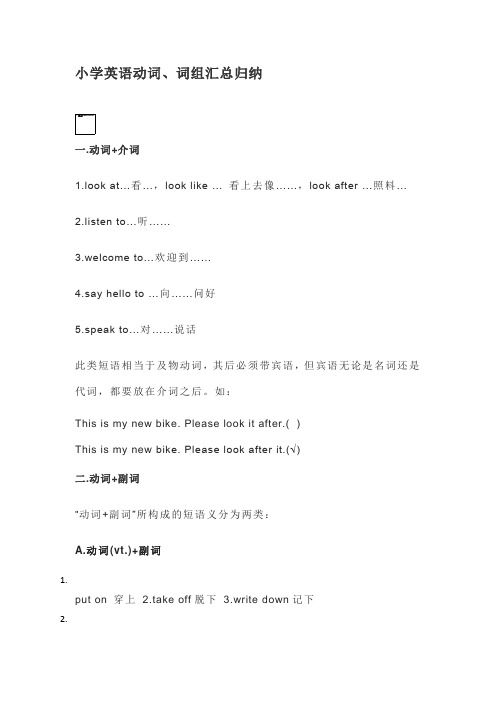
小学英语动词、词组汇总归纳一.动词+介词1.look at…看…,look like … 看上去像……,look after …照料…2.listen to…听……3.welcome to…欢迎到……4.say hello to …向……问好5.speak to…对……说话此类短语相当于及物动词,其后必须带宾语,但宾语无论是名词还是代词,都要放在介词之后。
如:This is my new bike. Please look it after.(×)This is my new bike. Please look after it.(√)二.动词+副词“动词+副词”所构成的短语义分为两类:A.动词(vt.)+副词1.put on 穿上 2.take off脱下 3.write down记下2.此类短语可以带宾语,宾语若是名词,放在副词前后皆可;宾语若是人称代词,只能放在副词的前面。
试比较:First listen to the tape, then write down the answer/write the answer down. (√)First listen to the answer, then write down it.(×)First listen to the answer, then write it down.(√)B.动词(vi)+副词e on赶快2.get up起床3.go home回家e in进来5.sitdown坐下 6.stand up起立此类短语属于不及物动词,不可以带宾语。
三.其它类动词词组1.close the door2.1ook the same3.go to work/class4.be ill5.havea look/seat 6.have supper 7.1ook young 8.go shopping 9.watchTV/games 10. play games.介词短语聚焦“介词+名词/代词”所构成的短语称为介词短语。
小学英语词汇短语句型总汇
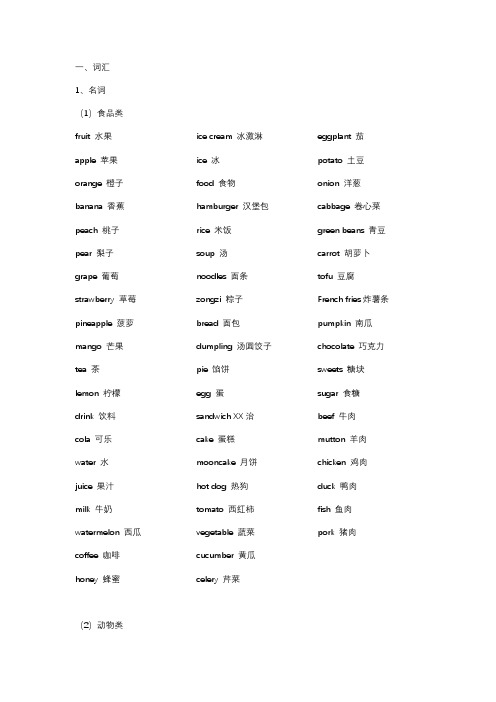
一、词汇1、名词(1)食品类fruit 水果apple 苹果orange 橙子banana 香蕉peach 桃子pear 梨子grape 葡萄strawberry 草莓pineapple 菠萝mango 芒果tea 茶lemon 柠檬drink 饮料cola 可乐water 水juice 果汁milk 牛奶watermelon 西瓜coffee 咖啡honey 蜂蜜ice cream 冰激淋ice 冰food 食物hamburger 汉堡包rice 米饭soup 汤noodles 面条zongzi 粽子bread 面包dumpling 汤圆饺子pie 馅饼egg 蛋sandwich XX治cake 蛋糕mooncake 月饼hot dog 热狗tomato 西红柿vegetable 蔬菜cucumber 黄瓜celery 芹菜eggplant 茄potato 土豆onion 洋葱cabbage 卷心菜green beans 青豆carrot 胡萝卜tofu 豆腐French fries炸薯条pumpkin 南瓜chocolate 巧克力sweets 糖块sugar 食糖beef 牛肉mutton 羊肉chicken 鸡肉duck 鸭肉fish 鱼肉pork 猪肉(2)动物类Animal 动物insect 昆虫chicken 小鸡hen 母鸡duck 鸭fish 鱼goose 鹅pig 猪dog 狗puppy 小狗cat 猫panda 熊猫bear 熊koala 树袋熊monkey 猴子tiger 老虎lion 狮子elephant 大象horse 马zebra 斑马squirrel 松鼠kangaroo 袋鼠snake 蛇fox 狐狸deer 鹿giraffe 长颈鹿lamb 小羔羊goat 山羊sheep 绵羊donkey 驴子seal 海豹squid 鱿鱼rabbit 兔子shark 鲨鱼lobster 龙虾sperm whale 抹香鲸cow 奶牛mouse 老鼠killer whale 虎鲸ant 蚂蚁bird 鸟bee 蜜蜂(3)称呼及职业名称people 人们man 男人woman 妇女boy 男孩girl 女孩baby 婴儿kid 孩子children 儿童friend 朋友grandparents 祖父母grandfather 祖父member 成员family 家庭father 父亲grandpa 爷爷dad 爸爸mother 母亲grandmother 祖母grandma 奶奶mom 妈妈parents 父母daughter 女儿son 子aunt 阿姨婶、舅母brother 兄弟cousin 堂兄弟、姐妹uncle 叔伯舅sister 姐妹neighbor 邻居worker 工人cook 厨师policeman 警察policewoman 女警postman 邮递员driver 司机farmer 农民nurse 护士engineer 工程师doctor 医生teacher 老师student 学生classmate 同学principal 校长assistant售货员reporter 记者player 运动员climber 攀登visitor 参观者writer 作者actor 男演员actress女演员singer 歌唱家artist 画家cleaner 清洁工tourist 旅游者accountant会计salesperson销售员university student 大学生(4)校园常用名词school 学校classroom 教室class 班级seat 座位library 图书馆reading room 阅览室music room 音乐室puter room 计算机房canteen 食堂art room 绘画室bedroom 寝室gym 体育馆chess 国际象棋desk 书桌music class 音乐课English class 英语课P.E.class 体育课social class 社会课chair 椅子Moral Education 思想品德课playground 操场English book 英语书Chinese book 语文书math book 数学书book 书copybook 抄写本story 故事story book 故事书note book 笔记本school bag 书包picture 图画pen 钢笔pencil 铅笔brush 毛笔画笔yo-yo溜溜pencil box 铅笔盒pencil case 铅笔袋sharpener 卷笔刀eraser 橡皮ruler 直尺knife 小刀crayon 蜡笔candle 蜡烛ball 球balloon 气球basketball篮球football 足球baseball 棒球tennis 网球volleyball 排球table tennis 乒乓球piano 钢琴game 游戏violin 小提琴swing 秋千mask 面具kite 风筝paper 纸newspaper 报纸magazine 杂志map 地图dictionary 字典stamp 邮票card 卡片chart 图表post card 明信片ic 漫画diary 日记model 模型blackboard 黑板subject 学Chinese 语文math 数学English 英语art 美术music 音乐P.E. 体育science 科学social 社会test 测试letter 信board 写字板hobby 爱好piic 野餐design 设计sports 体育运动size 尺码photo 照片pen pai 笔weekend 周末painting 绘画goal 得分trip 旅行holiday 假日name 名字number(5)家庭常见物品building 楼房house 房屋home 家wall 墙gate 大门door 门lock 锁key 钥匙window 窗户room 房间TV room 电视机房study 书房living room 起居室washroom 卫生间bathroom 浴室kitchen 厨房light 灯lamp 台灯garden 花园flower 花curtain 窗帘floor 地板tent 帐篷box 盒子bag 包clothes 衣服coat 外套jacket 夹克sweater 毛衣shirt 衬衫T-shirt T恤衫skirt 短裙dress 连衣裙pants 长裤jeans 牛仔裤shorts 短裤vest 马夹shoes 鞋子socks 短袜sneakers 网球鞋slippers 拖鞋sandals 凉鞋boots 靴子bed 床shelf 书架sofa 沙发money 钱pet 宠物fan 扇子umbrella 伞toy 玩具doll 玩具娃娃puppet 木偶mirror 镜子b 梳子glasses 眼镜closet 壁橱end table 床头柜table 餐桌trash bin 垃圾箱pot 锅plate 盘子fork 叉spoon 勺子chopsticks 筷子bike 自行车motor cycle 摩托车fridge 冰箱camera 照相机telescope 望远镜watch 手表clock 钟puter 电脑walkman 随身听TV 电视机air-conditioner 空调Mobile phone 手机phone(6)季节(season)spring 春季summer 夏季fall 秋季winter 冬季(7)星期(week)Sunday 周日Monday 周一Tuesday 周二Wednesday 周三Thursday 周四Friday 周五Saturday 周六(8)月份(month)January 一月February 二月March 三月April 四月May 五月June 六月July 七月August 八月September 九月October十月November十一月December十二月(9)身体器官head 头hair 头发neck 脖子face 脸eye 眼睛eyebrow 眉毛nose 鼻子mouth 嘴ear 耳朵arm 手臂hand 手finger 手指leg 腿foot 脚knee 膝盖toe 脚趾shoulder 肩tail 尾巴body 身体(10)运动项目fishing 钓鱼rowing 划船swimming 游泳running 跑skiing 滑雪skating 滑冰(11)公共场所street 街road 马路way 道路bridge 桥path 路town 镇city 城市bank 银行shop 商店bookstore 书店centre购物中心park 公园supermarket 超级市场crossing 十字路口zoo 动物园museum 博物馆hospital 医院station 火车站airport 飞机场cinema 电影院river 河stream 小溪lake 湖sea 海post office 邮局farm 农场wood 树林forest 森林village 乡村country 国家(12)其他名词Canada/CAN 加拿大America/USA 美国England/UK 英国Hong Kong XX China/PRC中国New York纽约Australia澳大利亚sun 太阳sky 天空air 空气cloud 云vapour 蒸汽wind 风rain 雨rainbow 彩虹nest 巢snow 雪soil 土壤tree 树grass 草sprout 苗、芽A.M./morning 上午P.M./afternoon 下午noon 中午evening 傍晚night 夜晚breakfast 早餐lunch 午餐dinner 晚餐weather 天气medicine 药taxi 出租车jeep 吉普车plane 飞机subway 地铁ear 轿车bus 公共汽车train 火车traffic 交通ship 轮船boat 小船robot 机器人mountain 山脉hill 小山colour 颜色white 白色black 黑色blue 蓝色green 绿色red 红色pink 粉红色brown 棕色orange 橙色grey 灰色purple 紫色yellow 黄色time 时间minute 分钟second 秒meter 米centimeter 厘米kilometer 千米idea 主意question 问题queen 女王pany 公司factory work 工作menu 菜单thing 事tip有用的建议hurt 疼痛fun有趣的事leaf(leaves)叶子Halloween 万圣节前夕Thanksgiving 感恩节team 队matter 麻烦exercise锻炼piic野餐present 礼物gift 礼物2、动词start 开始(与bagin可通用) e 来go 去stand 站sit 坐open 开close 关turn on 开turn off 关put 放ask ①问(词组ask sb.a question问某人一个问题)②请求(ask sb. for向某人要某物;asksb. to do sth让某人干某事)answer 回答(answer sb.回答某人;answer this question回答这个问题)remember 记得(remember sth.记得某事;remember to do sth.记住要干某事)forget 忘记(forget sth. 忘记某事;forget to do sth.忘记要干某事)park 车辆drink 喝eat 吃hear 听见hear of听说;hear from sb.收到某人的来信have 有、吃(have lunch/breakfast/supper)、进行某一行为(have a look/rest/bath)listen 听(不及物动词,listen to才可接宾语)speak 说某种语言(speak English)、说话(speak loudly)tell 告诉(tell sb.about sth.);讲述(tell a story)say说(内容)read读draw画see 看见like 喜欢love 爱find找到plant 种植talk 谈话(talk about sth.谈论某事;talk to/with sb.和某人交谈)write 写(write s letter to sb.写信给某人)look 看(不及物动词,look at才可接宾语;look for寻找;look after照看)feed饲养(feed sb.on/with sth用…喂…)play玩(play with sb.和某人玩;play football踢足球;play with sth.玩某物;play the piano 弹钢琴)sing唱(sing a song唱歌)dance跳舞jump跳touch触摸climb爬(climb the hill爬山)run跑swim游泳skate滑冰ski滑雪fly飞,放飞mean意指thank感谢work工作use使用kick踢(kick down the door把门踢倒;kick off the shoes把鞋子踢掉)teach教(teach sb.sth.教某人某事)help帮助(help sb.to do sth.帮助某人干某事help sb.with sth.在…方面帮助某人;)make制造need需要wear穿着cut切、剪(cut the cake;cut the paper)fold折叠(fold the paper)bend使…弯曲(bend your knees)finish完成(finish doing sth.做完某事)give给(give sb. sth.=give sth. to sb.)pass递(pass sb. sth.=pass sth.to sb.)show显示(show sb. sth.=show sth.to sb.)wele欢迎meet遇见call打hope希望(hope to do sth.)relax放松guess猜测learn学习bounce反弹buy买shine照耀walk走swing摇摆rain下雨return归还know知道match使竞争miss想念row划船leave离开sleep睡wake叫醒win胜利collect收集turn转弯prepare准备(prepare for为…做准备)take乘坐(take the plane坐飞机);买;照、拍(take photos照相片)visit参观(visit China访问中国;visit a friend看朋友)want想要(want sb.to do sth希望某人做某事)fall落下(fall into a river跌入河中)例:The rain is falling.正在下雨。
小学英语动词短语归纳
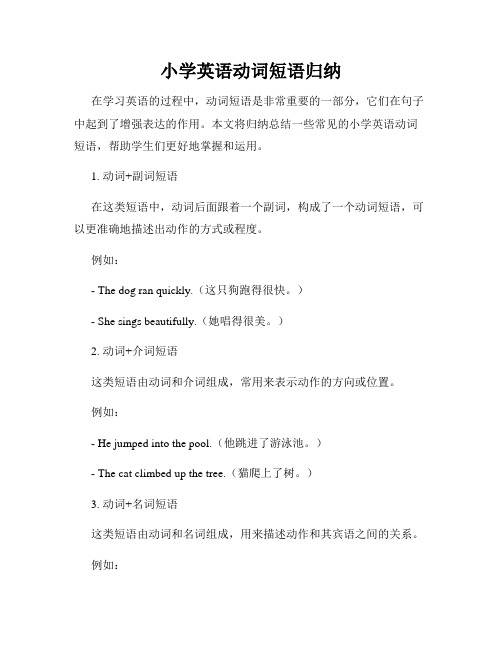
小学英语动词短语归纳在学习英语的过程中,动词短语是非常重要的一部分,它们在句子中起到了增强表达的作用。
本文将归纳总结一些常见的小学英语动词短语,帮助学生们更好地掌握和运用。
1. 动词+副词短语在这类短语中,动词后面跟着一个副词,构成了一个动词短语,可以更准确地描述出动作的方式或程度。
例如:- The dog ran quickly.(这只狗跑得很快。
)- She sings beautifully.(她唱得很美。
)2. 动词+介词短语这类短语由动词和介词组成,常用来表示动作的方向或位置。
例如:- He jumped into the pool.(他跳进了游泳池。
)- The cat climbed up the tree.(猫爬上了树。
)3. 动词+名词短语这类短语由动词和名词组成,用来描述动作和其宾语之间的关系。
例如:- They opened the door.(他们打开了门。
)- I have a pet dog.(我养了一只宠物狗。
)4. 动词+形容词短语这类短语由动词和形容词组成,用来描述动作的特征或状态。
例如:- The boy looked surprised.(那个男孩看起来惊讶。
)- She felt tired after running.(她跑完后感到很累。
)5. 动词+副词+名词短语这类短语由动词、副词和名词组成,常用来表示动作的方式和结果。
例如:- He cut the cake into pieces.(他把蛋糕切成了小块。
)- She baked the cookies perfectly.(她完美地烤出了饼干。
)6. 动词+副词+介词短语这类短语由动词、副词和介词组成,用来表示动作的细节或情况。
例如:- They ran out of the room quickly.(他们迅速地从房间里跑出来。
)- We walked across the bridge slowly.(我们慢慢地走过了桥。
小学英语必考知识点总结_小学英语总结
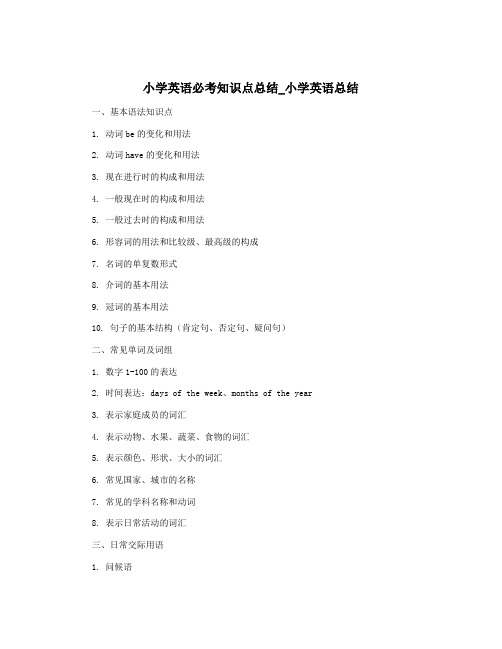
小学英语必考知识点总结_小学英语总结一、基本语法知识点1. 动词be的变化和用法2. 动词have的变化和用法3. 现在进行时的构成和用法4. 一般现在时的构成和用法5. 一般过去时的构成和用法6. 形容词的用法和比较级、最高级的构成7. 名词的单复数形式8. 介词的基本用法9. 冠词的基本用法10. 句子的基本结构(肯定句、否定句、疑问句)二、常见单词及词组1. 数字1-100的表达2. 时间表达:days of the week、months of the year3. 表示家庭成员的词汇4. 表示动物、水果、蔬菜、食物的词汇5. 表示颜色、形状、大小的词汇6. 常见国家、城市的名称7. 常见的学科名称和动词8. 表示日常活动的词汇三、日常交际用语1. 问候语2. 表示喜欢或不喜欢的词汇3. 表示身体部位的词汇4. 表示情感的词汇5. 表示方向的词汇四、常见句型1. What’s this/that? It’s a/an…2. Is this/that a …? Yes, it is. / No, it isn’t.3. What colour is it? It’s…4. How many… are there? There are…5. What’s your/his/her name? My/His/Her name is…6. How old are you? I am … years old.7. Do you like…? Yes, I do. / No, I don’t.8. Where are you from? I am from…五、日常活动1. 描述日常活动的词汇及句子2. 描述日常活动的频率:always、usually、often、sometimes、never3. 表达日常活动所需的动词短语六、常见情景对话1. 自我介绍2. 询问年龄、姓名3. 询问喜欢的食物、颜色等4. 询问材料、颜色5. 询问位置、方向七、常见教学用语1. 教室用语和课堂指令2. 学习用具的名称3. 学习场所和物品的名称八、其他1. 常用生活用语和短语2. 主题相关的歌曲、儿歌和故事3. 形式多样的综合练习题,包括听力、口语、阅读、写作。
小学英语语法句型归纳总结

小学英语语法句型归纳总结英语作为一门国际语言,学习英语语法对于小学生来说是至关重要的。
掌握英语语法句型,不仅能够帮助学生更好地理解英语的用法,还能够提高他们的英语表达能力。
下面是对小学英语语法句型的归纳总结:一、简单句型1. 主语 + 动词(及物或不及物)例如:- I eat an apple.(我吃一个苹果。
)- They run in the park.(他们在公园里跑。
)2. 主语 + 动词 + 宾语例如:- She reads a book.(她读一本书。
)- Tom throws a ball.(汤姆扔一个球。
)3. 主语 + 系动词(be动词)+ 表语例如:- I am a student.(我是一个学生。
)- The flower is beautiful.(这朵花很漂亮。
)4. 主语 + 系动词(be动词)+ 地点例如:- The book is on the table.(书在桌子上。
)- The cat is under the chair.(猫在椅子下面。
)二、疑问句1. 一般疑问句使用助动词do、does或did加在句子的主语前,然后再加上动词原形。
例如:- Do you like ice cream?(你喜欢冰淇淋吗?)- Does he play basketball?(他打篮球吗?)2. 特殊疑问句特殊疑问句是用来询问特定信息或细节的问句,通常以疑问代词开头。
例如:- What is your name?(你叫什么名字?)- When is your birthday?(你的生日是什么时候?)- Where do you live?(你住在哪里?)在句子前面加上否定词,通常为don't、doesn't或didn't。
例如:- I don't like pizza.(我不喜欢披萨。
)- He doesn't have a pet.(他没有宠物。
小学中的常见动词短语知识点的归纳与解析
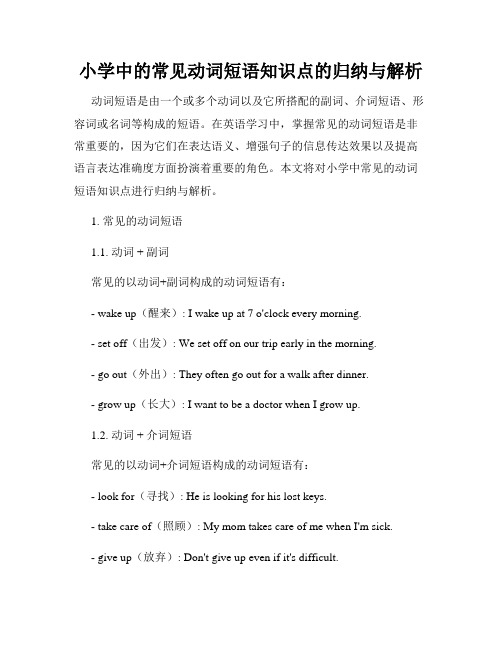
小学中的常见动词短语知识点的归纳与解析动词短语是由一个或多个动词以及它所搭配的副词、介词短语、形容词或名词等构成的短语。
在英语学习中,掌握常见的动词短语是非常重要的,因为它们在表达语义、增强句子的信息传达效果以及提高语言表达准确度方面扮演着重要的角色。
本文将对小学中常见的动词短语知识点进行归纳与解析。
1. 常见的动词短语1.1. 动词 + 副词常见的以动词+副词构成的动词短语有:- wake up(醒来): I wake up at 7 o'clock every morning.- set off(出发): We set off on our trip early in the morning.- go out(外出): They often go out for a walk after dinner.- grow up(长大): I want to be a doctor when I grow up.1.2. 动词 + 介词短语常见的以动词+介词短语构成的动词短语有:- look for(寻找): He is looking for his lost keys.- take care of(照顾): My mom takes care of me when I'm sick.- give up(放弃): Don't give up even if it's difficult.- get along with(与...相处): I get along well with my classmates.1.3. 动词 + 形容词常见的以动词+形容词构成的动词短语有:- come back(回来): She came back from her vacation yesterday.- fall asleep(入睡): The baby fell asleep in his mother's arms.- grow old(变老): Our grandparents are growing old.- run fast(跑得快): The cheetah runs very fast.1.4. 动词 + 名词常见的以动词+名词构成的动词短语有:- make friends(交朋友): It's important to make friends in school.- do homework(做作业): I need to do my homework before dinner.- play basketball(打篮球): They enjoy playing basketball in their free time.- take photos(拍照): Let's take some photos to remember this moment.2. 动词短语的用法和意义2.1. 动词 + 副词动词+副词构成的动词短语可以表达动作的方式、状态、频率等。
pep小学英语总复习(句型-短语-语法)
pep⼩学英语总复习(句型-短语-语法)PEP 三到六年级的动词词组answer the phone接buy a present买礼物catch butterflies捉蝴蝶clean the room 打扫房间climb mountains爬⼭collect stamps收集邮票come from来⾃,从……来cook dinner做饭cook the meals做饭do an experiment做实验do homework做作业do morning exercises做早操do housework做家务do the dishes 刷碗drink water 喝⽔draw pictures画画eat breakfast吃早饭lunch ,午饭dinner,晚饭, at home 在家fly kites放风筝go to bed睡觉go to school上学go to the cinema去看电影go to a park 去公园go to work上班go home 回家go swimming 去游泳go fishing 去钓鱼go hiking 去郊游go ice-skating 去滑冰go skiing 去滑雪go shopping 去购物go straight 直⾏get up起床have a picnic举⾏野餐have breakfast吃早餐have lunch吃午餐have dinner吃晚饭have Chinese classhave English class上英语课have music class上⾳乐课have P.E. class上体育课have math class上数学课have a cold 感冒have a fever 发烧have a sore throat 嗓⼦疼have a headache 头疼have a toothache ⽛疼like + doing 喜欢做某事look at看……live in 居住listen to music听⾳乐learn Chinese (学中⽂) make a snowman堆雪⼈make kites制作风筝make the bed铺床plant trees种树play chess下棋sweep the floor扫地play football踢⾜球play ping-pong 打乒乓球play sports 做活动play the violin拉⼩提琴play the piano弹钢琴play with…… 玩… put on 穿上read a book看书read books看书read a magazine阅读杂志set the table摆餐具sing and dance (唱歌跳舞) take a trip去旅⾏take some medicine 吃些药see the doctor看医⽣take (took) pictures照相turn left 向左转turn right向右转visit grandparents看望(外)祖⽗母write a letter写信write an 写电⼦water the flowers浇花wash the clothes洗⾐服watch insects观察昆⾍watch TV看电视have to必须go there去那open the door开门close the window关窗by bike骑车in the morning在早晨in the afternoon在下午at night在晚上in the evening在夜晚last Sunday上个星期天on the weekend在周末⼩学英语四种时态复习。
小学英语动词词组句型汇总归纳
小学英语动词、词组、句型汇总归纳由动词开头组成的短语、词组很多。
温习时应分类处置:一.动词+介词at…看…,look like … 看上去像……,look after …照料…to…听……to…欢迎到……hello to …向……问好to…对……说话此类短语相当于及物动词,其后必需带宾语,但宾语不管是名词仍是代词,都要放在介词以后。
如:This is my new bike. Please look it after.(×)This is my new bike. Please look after it.(√)二.动词+副词“动词+副词”所组成的短语义分为两类:A.动词(vt.)+副词1.p ut on 穿上off脱下down记下此类短语能够带宾语,宾语若是名词,放在副词前后皆可;宾语若是人称代词,只能放在副词的前面。
试比较:First listen to the tape, then write down the answer/write the answer down. (√) First listen to the answer, then write down it.(×)First listen to the answer, then write it down.(√)B.动词(vi)+副词on赶快up起床home回家in进来down坐下up起立此类短语属于不及物动词,不能够带宾语。
三.其它类动词词组the door the same to work/class ill a look/seat supper young shopping TV/games 10. play games.介词短语聚焦“介词+名词/代词”所组成的短语称为介词短语。
现将Unitsl-16经常使用的介词短语按用法进行归类。
+语言/颜色/衣帽等,表示利用某种语言或穿着……。
如:in English,in the hat+ Row/ Team/ Class/ Grade等,表示“在……排/队/班级/年级”等。
(完整word版)小学英语必背单词及短语句型
第三册要点bag 包 bed 床 beef 牛肉 book boy 男孩bread 面包brother 兄弟chair 椅子chicken 肉 classroom教室desk 桌doctor 医生friend 朋友girl 女孩home 家milk 牛奶mother pen 笔pencil 笔fishrice 米room 房ruler 尺子school 学校sister 姐妹student 学生teacher 教water 水window 窗nurse 士第四册要点computer 算机board 写字板fan 扇 light 灯this 个is 是my 我的that 那个your 你的 picture 画wall 壁floor 地板yes 是的 it 它 one 一two 二three 三 four 四five 五six 六seven 七eight 八nine 九 ten 十what 什么time it ’s=it i s 它是 o’clock 点⋯ math 数学Chinese 文English 英P.E. 体育music 音for ;class 程red 色的 blue 色的 yellow 黄色的green 色的 white 白色的no 不;不是not 不是的skirt 短裙shirt 衫 jacket 克衫T-shirt T 恤衫 dress衣裙 colour 色 warm 温暖的 cold 严寒的cool 凉快的 today 今日 jeans 牛仔 pantssocks 袜子shoes 鞋子 let ’ s我 play 玩,踢football 足球 snowy 下雪的sunny 明朗的 how much 多少 big 大的 small 小的 long 的short 短的banana香蕉pear 梨orange橙子watermelon 西瓜are 是(复数 ) they 它(他,她) horsearen ’不t是 (复数 ) cat 猫rabbit 兔子pig 猪 duck 子dog 狗 eleven 十一twelve 十二thirteen 十三 fifteen 十五 twenty 二十 how many 多少 there 那边 /里第五册要点smart 明的 old 年迈的 thin 瘦的 funny 风趣可笑的 tall 高的 active 活的but 可是 quiet 寂静 ;娴静的 very 很;特别 young 年 strong 壮的 kind 和切的 Mr. 先生 short 矮的 like 像;喜strict 格的 who’s=who is是 what ’s=what 是is什么 he’s=he 他is是she ’ s=she她is是 Monday 礼拜一 Tuesday 礼拜二 Wednesday礼拜三Thursday 礼拜四 . Friday 礼拜五Saturday礼拜六Sunday 礼拜天day 天;日子 have 有 ;吃on 在⋯⋯候 too 太;也grape 葡萄don’ t=do not不要 fruit 水果 salty 咸的 fresh 新的 .favourite 最喜的tasty 好吃的 fish茄子.sour 酸的we 我 lunch 午 ;中餐tomato 西柿potato 土豆tofu 豆腐green beans 青豆they ’ re=theyare 他 (她 ;它 ) 是 .curtain 窗帘trash bin 垃圾桶closet 衣橱 .mirror 子end table 床柜bedroom 寝室.kitchen 厨房 bathroom 生living room 客in 在⋯中/里on 在⋯上 under 在⋯下 near在⋯邻近 behind 在⋯后边 clothe 衣服river 河流flower 花grass草lake 湖泊 forest 丛林 pat 小道park 公园house房屋bridge tree 木 road 路;公路building 建筑物 clean 干的eggplant 茄子sweet 甜的第六册要点Apr. 四月 at 在⋯点Aug. 八月because 因best 最;极birthday 诞辰 date 日期 Dec. 十二月evening 夜晚 ;夜晚fall 秋季Feb. 二月flygrandpa;外公 her 她的 Jan. 一月July 七月June 六月May 五月 Mar. 三月 noon 正午 Nov.十一月 Oct. 十月often常season 季Sept. 九月 skate 溜冰 sleep 睡sometimes有候spring 春季 summer 夏季 swim 游泳 uncle 叔叔usually 往常 ; 一般why 什么weekend 周末which 哪一个winter 冬季honey 蜂蜜 study 房jump 跳 run 跑 kangaro 袋鼠climb 往上爬fight 打斗 swing ;秋千第七册要点:by ;乘⋯foot 脚 bike 自行 bus 公共汽 train 火how 怎 traffic 交通 stop 停;停站wait 等;等候 library post office 局 hospital 医院cinema 影院bookstore 店where 哪里 pleaseturn 弯right 右 left 左straight 成直地 then 而后 comic book 漫画 post card 明信片newspaperbuyhobby 好dive 跳水 live 居住 teach教go 去 watch 看read ;看 does 助 doesn’t否认助singer 歌唱家writer 作家 actor 男演actress 女演 artist 画家TV reporter 台者engineer 工程accountant 会policeman 警察 salesperson 售cleaner 清工work 工作rain 雨;下雨 cloud 云;云彩 sun 太阳 stream小溪;小河 seed 种子soil 泥土sprout 苗;嫩芽 plant 植物;栽种should 应当then 而后第八册要点单词taller 更高的shorter 更矮的 stronger 更强健的older 年龄更大younger 更年青的 bigger 更大的heavier 更重的longer 更长的thinner 更瘦的 smaller 更小的hurt 痛苦:受伤 matter 事情sore 疼的 nose 鼻子 tired 疲惫的excited 喜悦的 angry 生气的happy 快乐的 bored 无聊的 sad 悲伤的 last 上一个;最后的weekend 周末 to 向:朝 park 公园 Chinese 汉语 ;中国的good 好的 present礼品 boat 小船elephant大象how 如何;多么watch-watched观看wash-washed洗clean-cleaned 打扫play-played 玩 visit-visited 探望 ;拜见;观光 do-did 做 go-went 去 read-read 读:阅读learn-learned 学习dance- danced跳舞eat-ate吃take-took 照;拍climb-climbed 爬have-had 有buy-bought 买row-rowed 划see-saw看见leave-left 走开get-got 抵达三至六年要点短English teacher英老math teacher数学老Chinese teacher文老have( an )English class上(一 )英on Wednesdays在礼拜三do my homework 造作w atch TV 看play computer games玩算机游my favourite 我最的sweep the floor地 cook the meals(cook dinner)做read books看clean the room清房water the flowers 花wash the clothes洗衣服set the table餐具make the bed床do the dishes 洗碗碟 go to bed 上床睡 clean the bedroom 清寝室use a computer 用算机 near the table 桌子旁 under the bed 床下over the river 河上方on the desk桌上 in the closet 衣橱里behind the door 后边 a picture of my room 一我房的照片 taller than比⋯⋯高 have a fever have a (bad) cold( 重 )感冒 have a toothache牙疼 have a headache 疼 have a sore throat 喉疼 watch TV 看 wash clothes 洗衣服 play football 踢足球visit grandparents 探望祖父亲母亲go to a park 去公园go fishing 去go swimming 去游泳went hiking 去足learn Chinese 学sing and dance 唱歌跳舞 eat good food 吃美食 take pictures 照相buy presents 礼品 row a boat划船go to see elephant去看大象go skiing 去滑雪go ice-skating 去溜冰 read a book(read books)看do morning exercises晨 eat breakfast/lunch/dinner吃早 /中/晚fly kites 放筝get up 起床 go hiking 去足climb mountains(climb a mountain)登山climb trees 爬go shopping 购物 make a snowman堆雪人 play sports 进行体育运动play the piano弹钢琴 play the violin 拉小提琴 visit grandparents探望祖父亲母亲 draw pictures 画画 answer the phone接电话 listen to music 听音乐write a letter 写信 write an e-mail 写电子邮件 write a report 写报告 drink water 喝水 watch( count)insects 察看 (数)昆虫 take pictures照相 catch butterflies 捉蝴蝶 come/be from 来自 play chess 下棋collect leaves/stamps采集树叶 /集邮 do an experiment做实验on foot 走路 by train 坐火车 by bus 坐公共汽车by bike 骑自行车by plane 坐飞机stop at a red right红灯停make kites制作风筝wait at a yellow light 黄灯等 go at a green light绿灯 traffic light 交通灯near the post office邮局邻近 next to the hospital医院近邻get to 抵达turn left/ right 左/右转go/walk straight 直走get on/off 上/下车take a trip 去旅游go to the cinema看电teach English教英语影next week 下周ride a bike 骑自行车read newspapers看报纸live in Beijing 住在北京watch TV at night 夜晚看电视read a magazine看杂志 go to work 上班plant flower seeds 栽花种plant trees种树pick up leaves采摘树叶put away the clothes(整理衣服 ) empty the trash(倒垃圾 ) wake up(醒来 )do housework(做家务 )take off(脱掉 ) put on(穿上 ) hang up(挂起 )疑问词what(什么 ) which( 哪一个 ) when(什么时候 ) where(在哪里 )why(为何 ) how(如何,如何 )how many(多少 ) how much(多少钱 )what about(⋯⋯⋯怎么)what time(几点)的写I ’m = I amit ’s = it ishe’s = he ishe’s = she isthat ’ s = thatwhois’ s = who iswhat ’ s = what theyis ’ re = they are isn ’ t = is notaren ’ t = are notcan ’ t = cannotdon’ t = do not doesn ’ t = does notlet ’ s = let usI’ d=I would I ’ ll=I will第四册句型This is my computer. 这是我的计算机。
小学四年级常见动词短语归纳及句子构造
小学四年级常见动词短语归纳及句子构造动词是语言中最基本、最常用的词类之一。
在日常交流和写作中,我们经常使用动词来表达动作或状态。
而动词短语是由一个或多个动词与其他词类组成的短语,在句子中起到一定的作用。
本文将归纳小学四年级常见的动词短语,并以句子的形式进行构造,以帮助学生更好地理解和运用这些动词短语。
1. 动词+副词短语1.1. look after(照顾)- Mum, can you look after my pet dog while I'm at school?(妈妈,我上学的时候你能照看好我的宠物狗吗?)1.2. take off(脱下)- It's hot today, so I need to take off my jacket.(今天很热,所以我需要脱掉外套。
)1.3. get up(起床)- I usually get up at 7 o'clock in the morning.(我通常在早上7点起床。
)2. 动词+介词短语2.1. look at(看)- The teacher asked us to look at the blackboard and listen carefully.(老师让我们看着黑板,认真听讲。
)2.2. go to(去)- Tomorrow, we will go to the zoo to see the animals.(明天,我们将去动物园看动物。
)2.3. play with(玩)- Can I play with your toy car, please?(请问我可以玩你的玩具车吗?)3. 动词+名词短语3.1. do homework(做作业)- After school, I need to do my math homework.(放学后,我需要做数学作业。
)3.2. make lunch(做午餐)- Dad, can you help me make lunch today?(爸爸,你能帮我今天做午餐吗?)3.3. take a bath(洗澡)- My little sister takes a bath before going to bed every night.(我妹妹每晚睡觉前都会洗澡。
- 1、下载文档前请自行甄别文档内容的完整性,平台不提供额外的编辑、内容补充、找答案等附加服务。
- 2、"仅部分预览"的文档,不可在线预览部分如存在完整性等问题,可反馈申请退款(可完整预览的文档不适用该条件!)。
- 3、如文档侵犯您的权益,请联系客服反馈,我们会尽快为您处理(人工客服工作时间:9:00-18:30)。
小学英语动词、词组、句型汇总归纳由动词开头构成的短语、词组很多。
复习时应分类处理:
一.动词+介词
1.look at…看…,look like … 看上去像……,look after …照料…
2.listen to…听……
3.welcome to…欢迎到……
4.say hello to …向……问好
5.speak to…对……说话
此类短语相当于及物动词,其后必须带宾语,但宾语无论是名词还是代词,都要放在介词之后。
如:
This is my new bike. Please look it after.(×)
This is my new bike. Please look after it.(√)
二.动词+副词
“动词+副词”所构成的短语义分为两类:
A.动词(vt.)+副词
1.put on 穿上
2.take off脱下
3.write down记下
此类短语可以带宾语,宾语若是名词,放在副词前后皆可;宾语若是人称代词,只能放在副词的前面。
试比较:
First listen to the tape, then write down the answer/write the answer down. (√)
First listen to the answer, then write down it.(×)
First listen to the answer, then write it down.(√)
B.动词(vi)+副词
e on赶快
2.get up起床
3.go home回家
e in进来
5.sit down坐下
6.stand up起立
此类短语属于不及物动词,不可以带宾语。
三.其它类动词词组
1.close the door
2.1ook the same
3.go to work/class
4.be ill
5.have a look/seat
6.have supper
7.1ook young
8.go shopping
9.watch TV/games 10. play games.
介词短语聚焦
“介词+名词/代词”所构成的短语称为介词短语。
现将Unitsl-16常用的介词短语按用法进行归类。
1.in+语言/颜色/衣帽等,表示使用某种语言或穿着……。
如:in English,in the hat
2.in + Row/ Team/ Class/ Grade等,表示“在……排/队/班级/年级”等。
3.in the morning/ afternoon/ evening/ 表示“在上午/下午/傍晚”等一段时间。
4.in the desk/ pencil-box/bedroom 等表示“在书桌/铅笔盒/卧室里”。
5.in the tree表示“在树上(非树本身所有)”;on the tree表示“在树上(为树本身所有)”。
如:There are some in the tree. There are many apples on the trees.
6.in the wall表示“在墙上(凹陷进去)”;on the wall表示“在墙上(指墙的表面)”。
如:There’re four windows in the wall, and there is a map on the back wall.
7.at work(在工作)/at school(上学)/at home(在家)应注意此类短语中无the。
8.at + 时刻表示钟点。
如:at six, at half , past ten.
9.like this/that表示方式,意为“像……这/那样”。
10.of短语表示所属关系。
如:a picture of a classroom, a map of China.
11.behind/ beside/ near/ under+ 名词等,表示方位、处所。
如:beside/ near the door, under/ behind the tree.
12.from与to多表示方向,前者意为“从……”,后者意为“到……”。
如:from one to ten, (go) to school/ bed/ work.
另外,以下这些短语也必须掌握。
如:on duty, after breakfast, at night, at the door, in the middle, in the sky, on one’s bike等。
重点句型汇总
1.I think…意为“我认为……”,是对某人或某事的看法或态度的一种句型。
其否定式常用I don’t think…,如:I think he’s Mr Zhinag. (L17)I don’t think you are right.
2.give sth. to sb./ give sb. sth. 意为“把……给……”,动词give之后可接双宾语,可用这两种句型;若指物的宾语是人称代词时,则只能用give it/ them to sb. 如:
His parents give him a nice purse./His parents give a nice purse to him. Give it to Mr Hu.(L57)
3.take sb./ sth. to…意为“把……(送)带到……”,后常接地点,也可接人。
如:
Please take the new books to the classroom.
4.One…, the other…/One is…and one is…意为“一个是……;另一个是……”,必须是两者中。
如:One is red and one is grey.(L50)或One is red,, the other is grey.
5.Let sb. do sth. 意为“让某人做某事”,人后应用不带to的动词不定式,其否定式为Don’t let sb,do sth.,或Let sb. not do sth. 另外,Let’s 与Let us的含义不完全相同,前者包括听者在内,后者不包括听者在内,如:Let’s go for a walk./Let us try once more, please.
6.help sb. (to) do sth./help sb. with sth.意为“帮助某人做某事”,前者用不定式作宾补,后者用介词短语作宾补,二者可以互换。
如:Let me help you find it.(L42)/Let me help you with it.
7.What about…?/How about…?意为“……怎么样?”是用来询问或征求对方的观点、意见、看法等。
about为介词,其后须接名词、代词或V-ing等形式。
如:What/How playing chess?
8.It’s time to do…/ It’s time for sth. 意为“该做……的时间了”,其中to 后须接原形动词,for后可接名词或V-ing形式。
如:It’s time to have supper. =It’s time for supper.
9.like to do sth./like doing sth.意为“喜欢做某事”,如:Li Lei and his friends like to play in the tree house. (L 43)前一种句型侧重具体的一次性的动作;后一种句型侧重习惯性的动作,试比较:
Tom likes swimming, but doesn’t like to swim this afternoon.
10.ask sb.(not) to do sth. 意为“让某人(不要)做某事”,其中ask sb.后应接动词不定式,如:
Ask your friends to guess what is in it. (L44)
11.show sb. sth. / show sth. to do. 意为“把某物给某人看”,该句型的用法同前面第2点。
如:
Show your friend your family photo.(L36)/Show your family photo to your friend.
12.introduce sb. to sb. 意为“把某人介绍给另一人”;introduce to sb.则是“向某人作介绍”。
如:Introduce your family to her.
如有侵权请联系告知删除,感谢你们的配合!。
